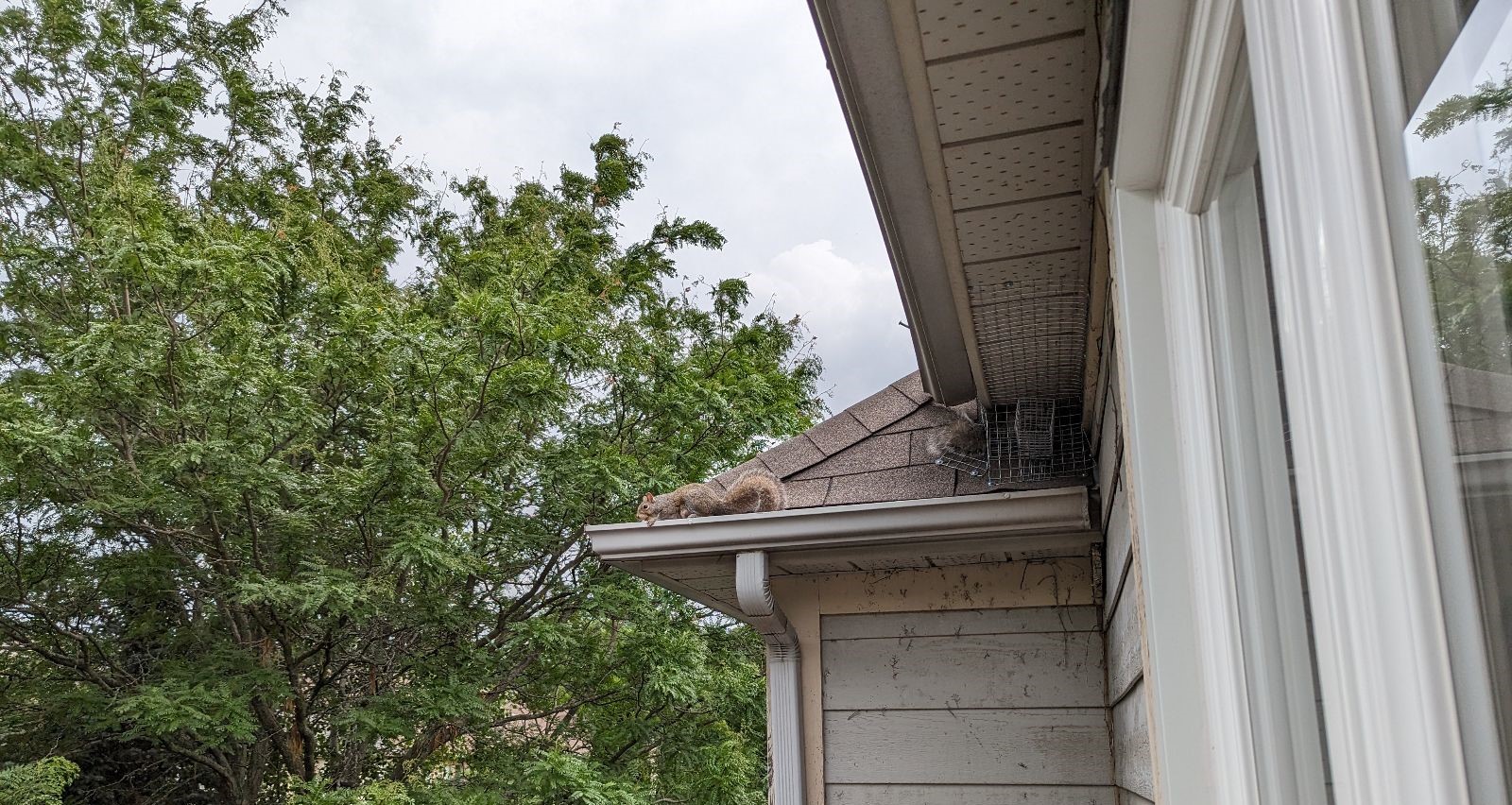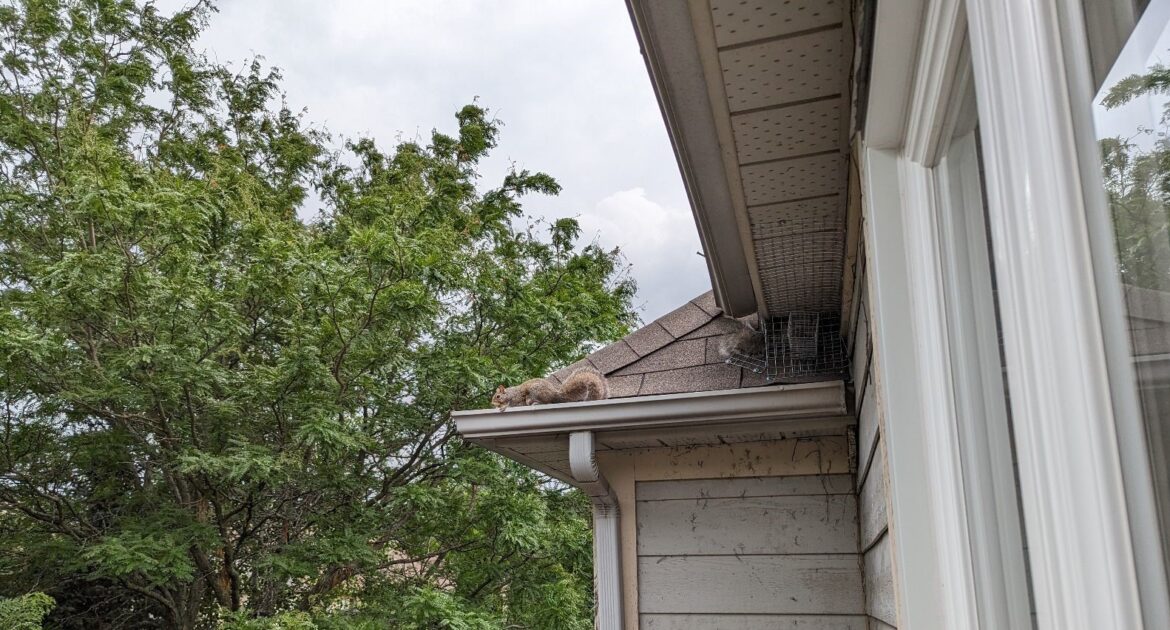Squirrels, with their bushy tails and quick movements, often capture our attention with a mix of affection and exasperation. Seen scampering across our yards, these furry acrobats straddle the line between being charming backyard visitors and notorious for their knack in finding their way into places they shouldn’t.
Their duality as both an endearing symbol of the wild and a complication in urban and suburban settings sets the stage for a deeper exploration into their true role within our ecosystem. It’s not simply about figuring out how to get rid of squirrels; it’s about understanding what is the purpose of squirrels, and how local wildlife removal in Bowie plays a part in maintaining the balance between human spaces and the natural world.
The ecological roles of squirrels extend far beyond their knack for raiding bird feeders or the occasional attic intrusion. These creatures play critical parts in seed dispersal, aiding in the regeneration of our forests and contributing to the biodiversity that maintains healthy ecosystems.
Their activities not only shape the physical environment but also influence the dynamics of local wildlife populations. Yet, despite their ecological importance, the interaction between squirrels and humans can sometimes lead to conflict, highlighting the need for responsible wildlife control strategies. By exploring the impact of squirrels in our ecosystem and the importance of their management, we will uncover why
The Secret Life of Squirrels: Nature’s Tiny Forest Gardeners
In the green spaces and the backyards of Bowie, a variety of squirrel species thrive, each contributing uniquely to the tapestry of our local environment. The Eastern Gray Squirrel, with its agile leaps and a keen sense for nuts, alongside the smaller, more elusive Red Squirrel, known for its fiery fur and spirited chatter, play pivotal roles in shaping our outdoor experience. These creatures, through their natural behaviors, exhibit a fascinating aspect of urban wildlife — balancing the line between coexistence and the sheer instinct for survival.
Squirrels, in their day-to-day activities, are master seed dispersed, inadvertently carrying out one of nature’s most crucial tasks. With each acorn stashed away for winter, squirrels not only prepare for their own survival but also contribute to the birth of new forests. Their forgetfulness leads to the sprouting of countless trees from the seeds they’ve hidden and never retrieved, which is essential for forest regeneration. This process enhances biodiversity, supports various life forms, and maintains the health and vibrancy of our surroundings.
The Impact of Squirrels on Local Ecosystems
In the intricate dance of our ecological theater, squirrels play a starring role that often goes unnoticed. At first glance, these nimble creatures might just seem like cute characters in the backdrop of our parks and gardens, but their presence is a keystone in the arch of biodiversity. Squirrels, in their quest for survival, inadvertently participate in a variety of ecological processes that bolster the richness of life in our surroundings—an aspect that truly underscores why understanding their role is crucial, beyond just pondering over how to manage their populations effectively.
By busily collecting and forgetting countless seeds, squirrels are nature’s unwitting gardeners, ensuring that our forests are replenished and that diverse plant species continue to thrive. This activity not only promotes a richer variety of flora but also supports a wider range of fauna that depend on these plants for shelter and sustenance. However, their impact is not solely positive. In their daily routines, these animals can also stir the pot of our carefully balanced ecosystems. The very same behaviors that make them effective seed spreaders can disrupt bird populations by competing for resources.
Additionally, their fondness for digging can sometimes turn our gardens into patchworks of holes, and their appetite for bark and young shoots can lead to damage in trees, leaving them vulnerable to disease and environmental stresses.
Yet, amidst the challenges, it’s vital to remember the broader picture. Our efforts to harmonize with these furry locals shouldn’t just focus on mitigating their less desirable antics but also on appreciating the essential role they fulfill in nurturing the diversity of life around us. Recognizing the nuanced contribution of squirrels to our ecological fabric encourages a more informed and compassionate approach to interacting with them—a reminder that every creature, no matter how small, has a part to play in the grand scheme of things.
Squirrels and Human Interactions
In the heart of our cities and the bounds of our backyards, squirrels can sometimes shift from being whimsical characters of nature to unwitting agents of chaos. Picture the all-too-familiar scene where the attic becomes a playground for these agile climbers, turning quiet spaces into arenas of noise and potential destruction. Similarly, our cherished gardens often bear the brunt of their foraging habits, leaving us to marvel at the paradox of adoring and admonishing the same creature.
These scenarios pose a silent question about the symbiotic relationship we share with these creatures in urban setups. The challenge isn’t just about the immediate inconvenience; it’s about understanding the ripple effects of their presence. Squirrels, in their essence, contribute significantly to the vibrancy and health of urban green spaces, playing roles that extend beyond the eye can see. They aid in the spread of seeds, inadvertently fostering green growth amidst concrete landscapes, and contribute to the dynamism of urban biodiversity.
Yet, the line between cohabiting and competing for space with squirrels is thin. Their activities, while beneficial to natural growth, can clash with human expectations of orderly gardens and peaceful home environments. It’s in this friction that the need for balanced interactions emerges – a dance of limits and allowances that respects the rhythms of nature while protecting our tranquil spaces.
Our Professional Squirrel Management Techniques
In the endeavor to harmonize human and animal habitats, our team at Skedaddle Humane Wildlife Control adopts cutting-edge and compassionate methods to address the presence of squirrels in urban settings. Our approach is twofold, emphasizing not only the immediate resolution of conflicts but also fostering environments where future encounters are minimized.
Through our practices, we highlight the importance of humane handling, which ensures the safety and well-being of both humans and animals, while proactively safeguarding the integrity of local ecosystems.
- Humane One-Way Doors: Skedaddle’s squirrel one-way doors enable adult squirrels to leave their dens but prevent re-entry. The mother squirrel promptly moves her offspring to new den locations. Squirrels keep various den sites for safety, ensuring rapid resettlement in the area.
- Exclusion Techniques: To prevent future entries, our team implements strategic modifications to homes and buildings. These include sealing entry points and installing barriers that discourage squirrels from returning, thus offering a durable solution without disrupting the animals’ lives.
In each step, our focus remains on delivering outcomes that respect the intricate balance between human habitats and wildlife territories. Our methods go beyond mere removal; they embody a philosophy of coexistence and minimal negative impact on the natural world.
How to Coexist with Squirrels
Living in Bowie offers unique opportunities to observe and interact with various forms of nature, including the spirited and resourceful squirrels. With a little understanding and effort, we can create an environment that allows us to coexist with these creatures, minimizing any negative impacts they might have on our homes and gardens. By implementing some practical measures, we can enjoy the presence of squirrels without the need to discourage them aggressively.
- Secure Your Trash and Compost: Make sure trash bins are tightly sealed and compost is covered. This prevents squirrels from being attracted to and dependent on your waste for food.
- Use Squirrel-proof Bird Feeders: Invest in bird feeders designed to deter squirrels. These feeders help ensure that birds can feed without competition and reduce the lure for squirrels to invade your space.
- Plant Decoy Gardens: Plant a small section of your garden with squirrel favorites, far from your main garden area. By providing them with their own space to forage, you’re less likely to find them in places they’re not wanted.
- Install Physical Barriers: Consider protective enclosures for vegetable beds or fruit trees to physically prevent access by squirrels.
By setting clear boundaries and providing alternative resources, we can foster a respectful cohabitation with the squirrels in our community. This strategy not only reduces the desire to engage in disruptive behaviors but also supports a broader understanding of living in harmony with all backyard visitors.
Balancing Act: Squirrel Harmony in Bowie, Prince George’s County
Squirrels, a vital part of urban wildlife in Prince George’s County, play significant ecological roles, including seed dispersion that leads to forest regeneration. However, their presence can also lead to conflicts within residential areas, causing damage to homes and gardens.
Recognizing the importance of these agile creatures, as well as the challenges they present, our humane wildlife control methods offer a balanced approach to managing squirrel populations. By employing humane one-way doors, removal strategies, and exclusion techniques, we foster a respectful coexistence, ensuring the well-being of both the local ecosystem and community.
Understanding and managing squirrel populations responsibly accentuates the harmony between human developments and wildlife habitats. This respectful approach benefits not only our immediate surroundings but reinforces a broader commitment to environmental stewardship and community well-being.
For those navigating the challenges of how to get rid of squirrels, seeking to understand what is the purpose of squirrels, or requiring local wildlife removal services in Bowie, our team is here to provide expert guidance and solutions. Contact us today to request a quote and learn more about how we can assist in managing your wildlife interactions responsibly.




